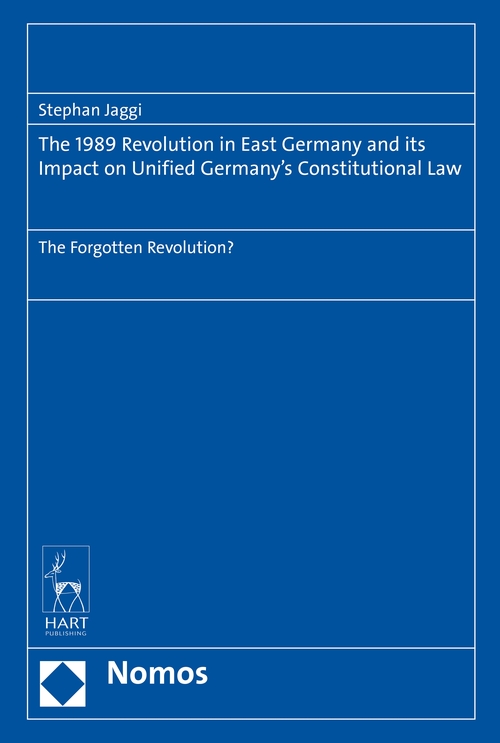Professor Dr. Stephan Jaggi’s new book, The 1989 Revolution in East Germany and its Impact on Unified Germany’s Constitutional Law – The Forgotten Revolution? (Hart and Nomos 2016), is receiving critical acclaim as a “path-breaking” and “seminal analysis” of East Germany’s 1989 Revolution.
World-renowned constitutional law and public policy scholar Bruce Ackerman, the Sterling Professor of Law and Political Science at Yale University, says of Professor Jaggi’s book that, “This path-breaking book provides a new framework for the deeper understanding of German constitutional development – challenging conventional wisdom with striking new insights into the dynamics of reunification after 1989.”
Donald P. Kommers, the Joseph and Elizabeth Robbie Professor of Political Science and Concurrent Professor Emeritus of Law, University of Notre Dame Law School, says:
“This book is a seminal analysis of East Germany’s peaceful revolution of 1989. It explodes the prevailing assumption that German unity was little more than an all-out takeover of the East German state under the auspices of West Germany’s Basic Law. It underscores the success – not the failure – of the East German citizens’ movement as a major constitutional event. Jaggi’s narrative documents in masterly detail the all-but-forgotten victories the movement had achieved in areas such as housing, land reform, environmental protection, social welfare, gender equality, and social property rights, several of which were constitutionally redefined in unified Germany as obligatory state goals. … This book is a ‘must-read’ for any student fascinated by constitutional decision-making in the aftermath of a popular revolutionary moment.”
Peter E. Quint, the Jacob A. France Professor Emeritus of Constitutional Law, University of Maryland Francis King Carey School of Law, says, “In his new book, Professor Jaggi presents a provocative and original view of the continuing importance of the ideas of the 1989 citizens’ movement in East Germany and the influence of those ideas on the constitutional law of united Germany. The views advanced in this carefully researched and impressive work will be of importance for anyone interested in German unification and its political and constitutional consequences.”

In his book, Professor Jaggi takes the position that it is wrong to reduce the meaning of the 1989 Revolution in East Germany to bringing about German unification and an unconditional adoption of West German constitutional law by the East German states. He argues that the Revolution had its own constitutional agenda, parts of which were transferred to unified Germany and integrated, mostly by the Federal Constitutional Court, into the West German constitutional order. Professor Jaggi’s analysis demonstrates that unified Germany’s constitutional law is, at least partly, a co-production of East German revolutionaries and the old Federal Republic, thereby offering a groundbreaking new perspective to this field of legal and historical scholarship.
Stephan Jaggi is a constitutional law expert focusing on German, U.S., and comparative constitutional law and constitutional theory. Before joining STL in 2013, he had a distinguished career as a judge in Germany, most recently as Judge at the Court of Appeals of the State of Schleswig-Holstein/Germany. He holds a German doctoral degree (Dr. iur.) from the University of Freiburg, an LL.M. degree from Yale Law School, and an American doctoral degree (J.S.D.) from Yale Law School. Professor Jaggi’s first book, Strategic Alliances in the European Telecommunications Sector, has been published by Nomos in 2003. Professor Jaggi teaches Constitutional Law, Comparative Constitutional Law, and Justice at STL.